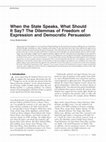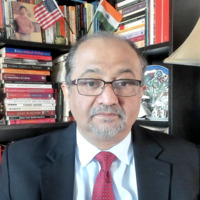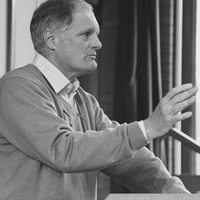Books by Corey Brettschneider

How should a liberal democracy respond to hate groups and others that oppose the ideal of free an... more How should a liberal democracy respond to hate groups and others that oppose the ideal of free and equal citizenship? The democratic state faces the hard choice of either protecting the rights of hate groups and allowing their views to spread, or banning their views and violating citizens' rights to freedoms of expression, association, and religion. Avoiding the familiar yet problematic responses to these issues, political theorist Corey Brettschneider proposes a new approach called value democracy. The theory of value democracy argues that the state should protect the right to express illiberal beliefs, but the state should also engage in democratic persuasion when it speaks through its various expressive capacities: publicly criticizing, and giving reasons to reject, hate-based or other discriminatory viewpoints.
Distinguishing between two kinds of state action--expressive and coercive--Brettschneider contends that public criticism of viewpoints advocating discrimination based on race, gender, or sexual orientation should be pursued through the state's expressive capacities as speaker, educator, and spender. When the state uses its expressive capacities to promote the values of free and equal citizenship, it engages in democratic persuasion. By using democratic persuasion, the state can both respect rights and counter hateful or discriminatory viewpoints. Brettschneider extends this analysis from freedom of expression to the freedoms of religion and association, and he shows that value democracy can uphold the protection of these freedoms while promoting equality for all citizens.

Democratic Rights: The Substance of Self-Government
When the Supreme Court in 2003 struck down a Texas law prohibiting homosexual sodomy, it cited th... more When the Supreme Court in 2003 struck down a Texas law prohibiting homosexual sodomy, it cited the right to privacy based on the guarantee of "substantive due process" embodied by the Constitution. But did the court act undemocratically by overriding the rights of the majority of voters in Texas? Scholars often point to such cases as exposing a fundamental tension between the democratic principle of majority rule and the liberal concern to protect individual rights. Democratic Rights challenges this view by showing that, in fact, democracy demands many of these rights.
Corey Brettschneider argues that ideal democracy is comprised of three core values--political autonomy, equality of interests, and reciprocity--with both procedural and substantive implications. These values entitle citizens not only to procedural rights of participation (e.g., electing representatives) but also to substantive rights that a "pure procedural" democracy might not protect. What are often seen as distinctly liberal substantive rights to privacy, property, and welfare can, then, be understood within what Brettschneider terms a "value theory of democracy." Drawing on the work of John Rawls and deliberative democrats such as Jürgen Habermas, he demonstrates that such rights are essential components of--rather than constraints on--an ideal democracy. Thus, while defenders of the democratic ideal rightly seek the power of all to participate, they should also demand the rights that are the substance of self-government.
http://www.amazon.com/Democratic-Rights-Self-Government-Corey-Brettschneider/dp/0691119708
Papers by Corey Brettschneider
Constitutional law and American democracy : cases and readings
The Oath and the Office: A Guide to the Constitution for Future Presidents by Corey Brettschneider Politics & Current Events
Politics & Current Events, The Oath and the Office: A Guide to the Constitution for Future Presidents, Sep 18, 2018
The Oath and the Office: A Guide to the Constitution for Future Presidents by Corey Brettschneider
Theorists of "popular constitutionalism" seek to ground constitutional interpretation in the demo... more Theorists of "popular constitutionalism" seek to ground constitutional interpretation in the democratic value of selfgovernment. They claim that the "people themselves," and not judges, should have the democratic authority to interpret the Constitution. These theorists regard judicial review by elite, unelected judges as being "counter-majoritarian" or undemocratic. In attempting to synthesize democratic and constitutional theory, however, popular constitutionalism faces some challenges. Specifically, I have argued previously that one of the leading popular constitutionalists, Larry Kramer, leaves two fundamental questions unanswered in his book, The People Themselves. 4 First, it is unclear who the "people" are. Kramer alternates between discussions of state legislators, Congress, and social movement leaders, implying that any entity but the Court could count as the people.

Les droits du peuple: valeurs de la démocratie (traduction française)
La democratie liberale est souvent presentee comme un regime contradictoire, pris entre le souci ... more La democratie liberale est souvent presentee comme un regime contradictoire, pris entre le souci de proteger les droits individuels des citoyens et la souverainete du peuple. Corey Brettschneider refute cette conception et explique que droits et souverainete, loin de se contredire, sont co-originaires. C’est en tant qu’auteurs et destinataires de la loi que les citoyens ont des droits fondamentaux. L’ideal democratique ne renvoie donc pas simplement a un ensemble de procedures, mais egalement a des valeurs cardinales : l’egalite des interets, l’autonomie politique et la reciprocite.C’est a partir de ces valeurs de la democratie et de l’etude de cas concrets que Brettschneider met en evidence les droits dont doivent jouir les membres du peuple souverain. Pour etre legitime, une democratie doit par exemple reconnaitre a tous les citoyens un droit a la vie privee, respecter le droit des condamnes a ne pas etre execute, et assurer un niveau elementaire de protection sociale pour tous, s...

Political Theory, 2011
In his comments, Jeff Spinner-Halev endorses my argument that the state should condition its dire... more In his comments, Jeff Spinner-Halev endorses my argument that the state should condition its direct funding of associations on their respect for free and equal citizenship. But he claims that this condition should not be applied to tax-exempt, non-profit status. In his view, tax exemption differs from state funding and should be subject to a weaker standard. The weak standard, as he calls it, is that associations are entitled to tax exemption as long as they do not practice "invidious discrimination." This raises the question at the heart of this exchange: should non-profit status be conditional on the stronger standard of groups not opposing the ideal of free and equal citizenship? In reply to Spinner-Halev, I argue that the state should condition tax exemption, and not just direct funds, on non-profits' providing some public good. At minimum, this entails that groups receiving non-profit status should not oppose the ideals of equality under law or "free and equal citizenship." I defend my position as being consistent with a diverse civil society. I also argue that although churches should not be exempt from my strong condition, the Catholic Church and Orthodox Jewish groups do meet this condition for nonprofit status. I welcome the chance to respond to Spinner-Halev's important arguments, and to elaborate the transformative theory of religious freedom that I proposed and defended in my article. The arguments in the article and this reply are further detailed in my forthcoming book, When the State Speaks,
T IS MY PLEASURE TO CONTINUE a dialogue with Tom Christiano about his book The Constitution of Eq... more T IS MY PLEASURE TO CONTINUE a dialogue with Tom Christiano about his book The Constitution of Equality. In a previous exchange, Christiano and I explored differences between his theory of democracy and rights and my own “value theory of democracy,” as articulated in Democratic Rights: the Substance of Self-Government. 1 In this exchange, I hope to focus on our more specific differences about the proper role of judicial review in a democracy.

Perspectives on Politics, 2010
Hate groups are often thought to reveal a paradox in liberal thinking. On the one hand, such grou... more Hate groups are often thought to reveal a paradox in liberal thinking. On the one hand, such groups challenge the very foundations of liberal thought, including core values of equality and freedom. On the other hand, these same values underlie the rights such as freedom of expression and association that protect hate groups. Thus a liberal democratic state that extends those protections to such groups in the name of value neutrality and freedom of expression may be thought to be undermining the values on which its legitimacy rests. In this paper, I suggest how this apparent paradox might be resolved. I argue that the state should protect the expression of illiberal beliefs, but that the state (along with its citizens) is also obligated to criticize publicly those beliefs. Distinguishing between two kinds of state action—coercive and expressive—I contend that such criticism should be pursued through the state's expressive capacities in its roles as speaker, educator, and spender....

The University of Toronto Law Review, 2020
In 1958, the Supreme Court of the United States ruled in Trop v Dulles that the Eighth Amendment ... more In 1958, the Supreme Court of the United States ruled in Trop v Dulles that the Eighth Amendment guarantees that citizens cannot be stripped of their democratic citizenship as punishment for a crime. In this article, I draw from this case to argue for a broader ‘Trop principle’ of justifiable state punishment. The Trop principle has two components. The first is that the justification for punishment must be based in citizenship; it says that democratic citizens, thinking generally about the law, would consent to a system where certain crimes warrant the loss of liberty. The second is that punishment cannot undercut its own rationale, meaning that if citizenship is the basis for legal punishment, then punishment cannot strip those subject to it of the rights necessary to the kind of citizenship fundamental in a democracy. Altogether, the Trop principle stands against subordination and viewing prisoners as less than citizens, and I conclude by suggesting that a further implication of the Trop principle is that prisoners must retain the right to vote, to ensure they retain the ability to exercise the participatory rights of democratic citizenship, including rights to vote in prison and free speech.

Perspectives on Politics, 2010
How should a liberal democracy respond to hate groups and others that oppose the ideal of free an... more How should a liberal democracy respond to hate groups and others that oppose the ideal of free and equal citizenship? The democratic state faces the hard choice of either protecting the rights of hate groups and allowing their views to spread, or banning their views and violating citizens' rights to freedoms of expression, association, and religion. Avoiding the familiar yet problematic responses to these issues, this book proposes a new approach called value democracy. The theory of value democracy argues that the state should protect the right to express illiberal beliefs, but the state should also engage in democratic persuasion when it speaks through its various expressive capacities: publicly criticizing, and giving reasons to reject, hate-based or other discriminatory viewpoints. Distinguishing between two kinds of state action—expressive and coercive—the book contends that public criticism of viewpoints advocating discrimination based on race, gender, or sexual orientatio...
A democratic theory of punishment: The Trop principle
University of Toronto Law Journal

Value Democracy at Home and Abroad
When the State Speaks, What Should It Say?
This concluding chapter examines some possible further implications of democratic persuasion that... more This concluding chapter examines some possible further implications of democratic persuasion that might be a source for further study. The first implication is that the book's view might serve as a model for other states that seek an alternative to the two dominant approaches to free speech. The third approach, democratic persuasion, allows free speech advocates to retain the protections against coercion found in rights of free expression. However, democratic persuasion also gives voice to the fundamental value of free and equal citizenship that underlies free speech. The second implication of the book's view is that it can also serve as a model for understanding how to promote ideals of equality in international law without violating the rights of individuals or the rights of states. Indeed, democratic persuasion already has a prominent role in international law.
Challenging Hate, Protecting Rights
Jurisprudence
Introduction: Democratic Rights: The Substance of Self-Government
Page 1. Electronic copy available at: http://ssrn.com/abstract=1712502 COPYRIGHT NOTICE:Corey Bre... more Page 1. Electronic copy available at: http://ssrn.com/abstract=1712502 COPYRIGHT NOTICE:Corey Brettschneider: Democratic Rights is published by Princeton University Press and copyrighted, © 2007, by Princeton University Press. All rights reserved. ...
Religious freedom is often thought to protect, not only religious practices, but also the underly... more Religious freedom is often thought to protect, not only religious practices, but also the underlying religious beliefs of citizens. But what should be said about religious beliefs that oppose religious freedom itself or that deny the concept of equal citizenship? The author argues here that such beliefs, while protected against coercive sanction, are rightly subject to attempts at transformation by the state in its expressive capacities. Transformation is entailed by a commitment to publicizing the reasons and principles that justify the basic rights of citizens.
Journal of Ethics and Social Philosophy
A Substantive Conception of the Rule of Law
NOMOS L, 2011











Uploads
Books by Corey Brettschneider
Distinguishing between two kinds of state action--expressive and coercive--Brettschneider contends that public criticism of viewpoints advocating discrimination based on race, gender, or sexual orientation should be pursued through the state's expressive capacities as speaker, educator, and spender. When the state uses its expressive capacities to promote the values of free and equal citizenship, it engages in democratic persuasion. By using democratic persuasion, the state can both respect rights and counter hateful or discriminatory viewpoints. Brettschneider extends this analysis from freedom of expression to the freedoms of religion and association, and he shows that value democracy can uphold the protection of these freedoms while promoting equality for all citizens.
Corey Brettschneider argues that ideal democracy is comprised of three core values--political autonomy, equality of interests, and reciprocity--with both procedural and substantive implications. These values entitle citizens not only to procedural rights of participation (e.g., electing representatives) but also to substantive rights that a "pure procedural" democracy might not protect. What are often seen as distinctly liberal substantive rights to privacy, property, and welfare can, then, be understood within what Brettschneider terms a "value theory of democracy." Drawing on the work of John Rawls and deliberative democrats such as Jürgen Habermas, he demonstrates that such rights are essential components of--rather than constraints on--an ideal democracy. Thus, while defenders of the democratic ideal rightly seek the power of all to participate, they should also demand the rights that are the substance of self-government.
http://www.amazon.com/Democratic-Rights-Self-Government-Corey-Brettschneider/dp/0691119708
Papers by Corey Brettschneider
Distinguishing between two kinds of state action--expressive and coercive--Brettschneider contends that public criticism of viewpoints advocating discrimination based on race, gender, or sexual orientation should be pursued through the state's expressive capacities as speaker, educator, and spender. When the state uses its expressive capacities to promote the values of free and equal citizenship, it engages in democratic persuasion. By using democratic persuasion, the state can both respect rights and counter hateful or discriminatory viewpoints. Brettschneider extends this analysis from freedom of expression to the freedoms of religion and association, and he shows that value democracy can uphold the protection of these freedoms while promoting equality for all citizens.
Corey Brettschneider argues that ideal democracy is comprised of three core values--political autonomy, equality of interests, and reciprocity--with both procedural and substantive implications. These values entitle citizens not only to procedural rights of participation (e.g., electing representatives) but also to substantive rights that a "pure procedural" democracy might not protect. What are often seen as distinctly liberal substantive rights to privacy, property, and welfare can, then, be understood within what Brettschneider terms a "value theory of democracy." Drawing on the work of John Rawls and deliberative democrats such as Jürgen Habermas, he demonstrates that such rights are essential components of--rather than constraints on--an ideal democracy. Thus, while defenders of the democratic ideal rightly seek the power of all to participate, they should also demand the rights that are the substance of self-government.
http://www.amazon.com/Democratic-Rights-Self-Government-Corey-Brettschneider/dp/0691119708